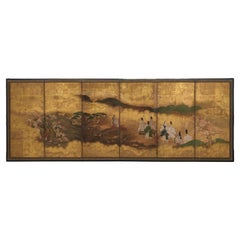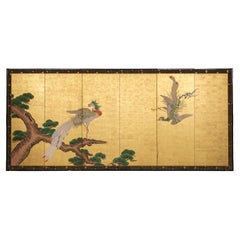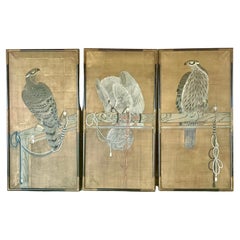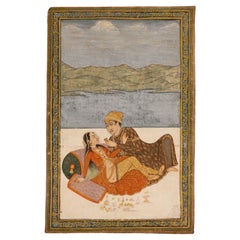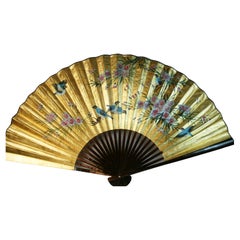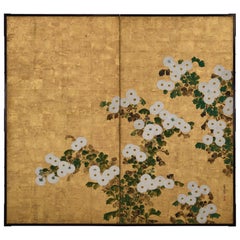Paper Paintings and Screens
to
65
470
114
733
19
9
8
8
7
2
1
1
116
310
307
28
107
59
42
12
9
4
2
4
8
12
4
2
767
761
716
535
479
708
621
484
120
44
761
753
754
3
3
2
2
2
Material: Paper
Mid-size 6-panel byôbu 屏風 with a scene from The Tale of Genji
Located in Amsterdam, NL
A refined medium-sized six-panel byôbu (folding screen) showcasing a classical autumn court scene from chapter 7 of The Tale of Genji (Genji Monogatari), titled Momiji no Ga (The Aut...
Category
17th Century Japanese Antique Paper Paintings and Screens
Materials
Metal, Gold Leaf
Tall 6-panel byôbu with phoenixes attributed to Kanô Isen’in Naganobu
By Kano Isen'in Naganobu
Located in Amsterdam, NL
An exquisite, tall six-panel byôbu (folding screen) featuring a painting attributed to Kanô Isen’in Naganobu (1775–1828) depicting a pair of phoenixes (hô’ô) and a section of a large...
Category
Early 19th Century Japanese Antique Paper Paintings and Screens
Materials
Metal, Gold Leaf
Japanese Falconry Watercolor Panels, Set of Three
Located in Bradenton, FL
Set of Three Hand-Painted Japanese Watercolor Panels depicting falconry scenes, dating from the early 20th century. Each vertical panel features a meticulously rendered falcon perche...
Category
Early 20th Century Japanese Other Paper Paintings and Screens
Materials
Paint, Paper
Antique Indian Mughal Painting of a Couple in Erotic Embrace, 19th Century
Located in San Francisco, CA
Offered here is a gouache and gold miniature painting on paper of an amorous couple on a veranda set against a mountain and lake background.
The male dressed in a princely attire is ...
Category
Mid-19th Century Indian Antique Paper Paintings and Screens
Materials
Paper
$740 Sale Price
20% Off
Vintage Chinese Large Hand Painted Birds and Flowers Fan/ Screen
Located in Douglas Manor, NY
1746 Vintage Chinese hand painted oversized fan / screen with colorful flowers and blue birds
Folded size 45x4x3"
Category
1960s Vintage Paper Paintings and Screens
Materials
Bamboo, Paint, Paper
18th Century Japanese Rinpa Screen. White Chrysanthemums. School of Korin.
Located in Kyoto, JP
School of Ogata Korin
White Chrysanthemums
18th Century, Edo period.
A two-panel Japanese screen. Ink, color, gofun and gold leaf on paper.
Dimensions: H. 171 cm x W. 188 cm (67.5” x 74”)
On this two-panel Japanese screen we see blooming chrysanthemums, a flower which embodies the essence of autumn in Japan. Here the traditional floral theme has been simplified and stylized. The bright colors and asymmetrical composition against the delicate gold leaf create a luxurious and ornate work of art. Its background, a strikingly patinated grid of gold leaf, denies any sense of place or time and imbues everything with an ethereal glow. The leaves and stems of the plants are nothing more than pools of mottled color and ink without any outline whatsoever. These are typical Rinpa adaptations of traditional ink painting methods; tarashikomi, or diluted washes of color blended while very wet, and mokkotsu, or “bonelessness,” which creates forms without exterior outlines. The relief work of the rounded flower petals has been obtained by the moriage process (a mixture based on ground shells modeled on the surface of the paper).
On the lower right of the screen, the siganture “Hokyo Korin Jakumyo” and the “Hoshuku” seal can be read. Korin is Ogata Korin, famed for the Irises (Nezu Museum) and Red and White Plum Blossom (MOA Museum of Art) folding screens, both National Treasures. Korin worked in both Kyoto and Edo in the mid-Edo period. Korin was using the art name “Jakumyo” just after he received the Hokyo level, which was in 1701.
This particular screen was published in May of 1961 in the Japanese Sansai Fine Art Magazine*. An in depth article accompanies the photograph of the screen and and a photograph of the signature and seal. This article devotes much of its body to discussing the moriage technique, how it enlivens the chrysanthemum flowers and Korin’s specific skill in using the technique. The article goes on to discuss the most famous works of Korin, utilizing this technique, which were known at the time. Specifically a two-panel screen held in the Honolulu Museum which was discovered in the store-house of Takahashi Soan. A two-panel screen pair which the Nakano family own. A two-panel screen pair with chrysanthemums in moriage in fan designs owned by the Nomura family. Also a small folding screen featuring chrysanthemums held in the Yamato Bunkakan. The article goes on to say that this particular two-fold screen came from the Nijo family. Korin is known to have had a strong connection with the aristocratic Nijo family. The article explains that Korin received a lot of favors from the Nijo family and that this screen would have been gifted to them.
Since that time the Honolulu screen has been amended to ‘attributed to Ogata Korin’ and I do not know further details of the other 3 screens. Other Chrysanthemum screens...
Category
18th Century Japanese Edo Antique Paper Paintings and Screens
Materials
Gold Leaf
Japanese Edo Screen Kano School Isle of Immortals
Located in Rio Vista, CA
Fascinating 19th century Japanese Edo period six-panel byobu screen depicting the Isle of Immortals. The painting features white Manchurian cranes among pines and flowering plum cent...
Category
19th Century Japanese Edo Antique Paper Paintings and Screens
Materials
Brass, Gold Leaf
Japanese Showa Six Panel Screen Tales of Genji on Gilt
Located in Rio Vista, CA
Early 20th century Japanese showa period six panel byobu screen depicting an artistic reinterpretation of a scene from the tales or Genji Monogatari. The miniature style of the paint...
Category
20th Century Japanese Showa Paper Paintings and Screens
Materials
Silk, Wood, Paper
Japanese Rare Antique Pair Hand Painted Birds And Blue Waters Wedding screens
Located in South Burlington, VT
A lovely antique pair (2) Japanese hand-painted six-panel folding screens byobu- each conceived in an attractive birds, trees, and blue waters motif. Likely given as a wedding gift...
Category
19th Century Japanese Meiji Antique Paper Paintings and Screens
Materials
Wood, Paper
$760 Sale Price / set
20% Off
Mid 18th Century Japanese Screen Pair. Crows & Pines by Unkoku Toshuku.
Located in Kyoto, JP
Unkoku Toshuku (1722-1779)
Crows and Pines
A pair of six-panel Japanese Screens. Ink and gold leaf on paper.
Dimensions: Each Screen: H. 170.5 cm x W. 375 cm
Haha-cho or mynah birds, whose forms resemble crows in artwork, were commonly depicted in Japanese art. These types of paintings were originally modeled on paintings attributed to the 13th century Chinese painter Muqi (Mokkei), whose art was enormously influential in Japan. Crows only became a theme among Japanese artists from the later 1500s onward. They likely were inspired by these imported Chinese paintings of myna birds, which are not native to Japan, substituting the native species of crow instead.
The best known early examples of the depiction of Japanese crows are two Momoyama screen...
Category
Mid-18th Century Japanese Edo Antique Paper Paintings and Screens
Materials
Gold Leaf
Japanese Showa Four Panel Screen Fruiting Pomegranate Tree
Located in Rio Vista, CA
Exquisite mid-20th century Showa period four panel folding byobu screen featuring a fruiting pomegranate tree over a dramatic cream toned background. Vivid ink and natural pigment co...
Category
20th Century Japanese Showa Paper Paintings and Screens
Materials
Silk, Wood, Paper
Chinese Painting on Scroll Paper, China 19th Century, Birds and Nature Decor
Located in Auribeau sur Siagne, FR
Chinese painting on paper, which is unrolled once hung on the wall. It is a painting that depicts birds in nature, in the style of the 18th c...
Category
19th Century Chinese Chinese Export Antique Paper Paintings and Screens
Materials
Paper
$238 Sale Price
20% Off
Early 19th Century Japanese Screen. Cherry Blossom & Pheasants by Mori Tetsuzan
Located in Kyoto, JP
Mori Tetsuzan (1775-1841)
Pheasants and Cherry Blossoms
Two-fold Japanese screen. Ink, color, gofun, gold and silver on paper.
A two-fold Japanese bir...
Category
Early 19th Century Japanese Edo Antique Paper Paintings and Screens
Materials
Gold Leaf
Mid 19th Century Framed Japanese Painting. Mice & Millet
Located in Kyoto, JP
Obata Tosho (1812-1886)
Mice & Millet
Late Edo period, mid 19th Century
Framed Japanese Painting. Ink and color on paper.
Individually framed 19th century bird and flower paintin...
Category
Mid-19th Century Japanese Edo Antique Paper Paintings and Screens
Materials
Paper
Circa 1700 Japanese Screen Pair, Cranes & Pines, Kyoto Kano School
Located in Kyoto, JP
Pines and Cranes
Anonymous. Kyoto Kano School.
Late 17th/early 18th centuries, circa 1700.
Pair of six-panel Japanese folding screens.
Ink, gofun, pigment and gold leaf on paper.
This bold composition presents two pine trees extending to the left and right across a gold leaf background. One tree is silhouetted against a green ground, golden clouds obscuring its true size, the other stretches across a stylized waterway. The pines are paired with Manchurian cranes with red crests and snow white plumage. Both have been highly auspicious motifs in East Asia since Chinese antiquity. Here the artist utilized fluid and instinctive ink brushstrokes to define the trunk, branches and tail feathers, in strong contrast to the precision and sharp angularity of the crane’s legs and beaks. The adoption of this vast metallic painting support required an unerring sense of design and composition, so that the negative space surrounding motifs could imply context for the otherwise floating pictorial elements. The brushwork detailing the trunks of the pines, the exaggerated dimensions of the pine trees and the strength and dynamism of the composition are all reminiscent of Kano Eitoku...
Category
Late 17th Century Japanese Edo Antique Paper Paintings and Screens
Materials
Gold Leaf
Early 20th Century Japanese Cherry Blossom Screen by Kano Sanrakuki
Located in Kyoto, JP
Cherry Blossoms
Kano Sanrakuki (1898-1981)
Showa period, circa 1930
2-panel Japanese Screen
Color, gofun and gold leaf on paper
Against a backdrop of gold-leafed ground, the lichen covered trunk and branches of the life-sized cherry blossom tree reach out and beyond the confines of the pictorial surface. The overall composition has a feeling of flatness which draws emphasis to the surface and the three-dimensionality of the cherry blossoms. Painstakingly built-up layers of thickly applied shell-white gofun detail the voluminous blossoms and cover large areas of this tour-de-force of Japanese Nihonga painting. By simplifying the background, minimizing the number of colors and depicting the blossoms with such heavy relief, the artist has emphasized the stunning presence of the cherry tree. The type of tree depicted is the Yae-Zakura; a double-layered type of cherry blossom famed for its beauty and strength. When we think of Japanese cherry blossoms, the first thing that comes to mind is Somei Yoshino variety, which has a single flower with five almost white petals. This type is fragile and easily blown away by strong wind or rain. Most of the double-flowered cherry blossoms begin to bloom when the Somei-Yoshino falls, and the flowering period lasts longer than that of the Somei-Yoshino.
Kano Sanrakuki originally studied painting at the Kyoto City Arts and Crafts School under the tutelage of Yamamoto Shunkyo...
Category
Early 20th Century Japanese Showa Paper Paintings and Screens
Materials
Gold Leaf
Large Pair of 19th Century Chinese Framed Ancestor Portraits
Located in Norton, MA
Chinese households honor their ancestors in private family rituals, invoking their spirits for long life, health, and prosperity. Commemorative portraits, which came into vogue in th...
Category
19th Century Chinese Qing Antique Paper Paintings and Screens
Materials
Glass, Wood, Paint, Paper
Kiku to Hagi Byobu, Rinpa School Style, Edo Period.
Located in Point Richmond, CA
A Chrysanthemum and Bush Clover painting on gold leaf six-panel folding screen, painted with clusters of leafy green chrysanthemum plants with white blossoms having moriage relief petals of gofun growing amidst pink blossoming bush clover within a bunched bush clover garden fence rendered in lighter gold relief, all on a background entirely of rich gold leaf. These two flowers are symbolic of Japan and the autumn season. The classic patterned paper verso with a Naga Antiques...
Category
Early 1800s Japanese Edo Antique Paper Paintings and Screens
Materials
Gold Leaf
Chinese Ancestor Portrait of a Mandarin Dignitary
Located in Vero Beach, FL
Chinese ancestor portrait of a Mandarin Dignitary.
Antique tempera on paper painting of a Mandarin Dignitary wearing a red court dress and s...
Category
Mid-19th Century Chinese Qing Antique Paper Paintings and Screens
Materials
Paint, Paper
$1,760 Sale Price
20% Off
A Beautiful Set of Four China Trade Watercolors of Chinese Junks
Located in Nashua, NH
A beautiful set of four Chinese watercolor / gouaches of Junks and Sampans done by Chinese artists for the increasing western trade who were traveling during the late 18th C. to mid ...
Category
Early 19th Century Chinese Chinese Export Antique Paper Paintings and Screens
Materials
Paint, Paper, Wood
Chinoiserie Panel Hand Painted Wallpaper on Blue Tea Paper, Accept Custom Size
Located in Wuxi, 32
If you love the look of De Gournay wallpaper but not the price, this is for you.
The colorways in this sections present our latest colorways, which can be applied to any designs a...
Category
21st Century and Contemporary Chinese Paper Paintings and Screens
Materials
Paper
Persian Manuscript Page - Garden Scene
Located in Soquel, CA
Persian Manuscript Page depicting a garden scene. Circa 18th century.
Hand painted scene depicts a hilly outdoor landscape where people are congre...
Category
Late 18th Century Persian Islamic Antique Paper Paintings and Screens
Materials
Gold Leaf
$390 Sale Price / item
35% Off
Korean Asian Large Long Life Byobu Byeongpung Shipjangsaengdo Ten Panel Screen
Located in Studio City, CA
An absolutely gorgeous, monumental, exceptionally large Korean ten-panel Sipjangsaengdo Byobu folding screen depicting the ten symbols of longevity—sun, mountain, water, rock, cloud,...
Category
Mid-20th Century Korean Paper Paintings and Screens
Materials
Fabric, Wood, Paint, Paper
XIANG TIAN - 'Relaxing' - Vintage Watercolor Painting - Signed - China - 20th C.
Located in Chatham, ON
XIANG TIAN - 'Relaxing' - Vintage watercolor painting on paper - nice quality and composition - signed with a single red chop mark and Chinese characters (upper left) - signed and ti...
Category
Late 20th Century Chinese Chinese Export Paper Paintings and Screens
Materials
Paint, Paper
Japanese Chinese Asian Large Six-Panel Folding Byobu Screen Mythical Landscape
Located in Studio City, CA
A gorgeous, strangely beautiful, unusually engaging, and alluring hand-painted large six-panel Japanese/Asian Byobu folding screen depicting an almost magical/ mythical nature scene ...
Category
18th Century Japanese Edo Antique Paper Paintings and Screens
Materials
Gold Leaf
Late 17th Century Japanese Screen Pair. Battle of Ichi-no-tani and Yashima.
Located in Kyoto, JP
Anonymous
Late 17th Century
Battle of Ichi-no-tani & Yashima
Dimensions: Each Screen: H. 175 cm x W. 385 cm (69” x 151.5”)
This pair of Japanese screens depict two significant battles from the Genpei War (1180–85), as recounted in the Tale of the Heike, a semi-historical epic chronicling the conflict between rival clans for control of Japan, written in the early 1200s.
Each screen portrays a single battle through a series of small episodes, framed by gold clouds, landscape elements, and architectural features. True to the style of many screens inspired by The Tale of the Heike, the scenes are rendered in lavish colors and gold, downplaying the brutality of the warfare. Although based on real events, these narratives often glorified and romanticized the heroic feats of the warriors. Viewers at the time would have been familiar with the story’s details, leading to a proliferation of paintings on folding screens inspired by this theme from the late Muromachi to the early Edo periods.
On the right screen, we see the Minamoto’s attack on the Taira, who have retreated from the capital, Kyoto, toward the sea. The central building represents the temporary Taira headquarters, where Taira soldiers are holding the young Emperor Antoku. The Minamoto plan to launch a surprise attack from the rear after descending the steep cliff known as Ichi-no-tani, depicted at the top center. This scene highlights the tactical brilliance of Minamoto commander Yoshitsune and the courage of his men.
The left screen captures moments from the Battle of Yashima...
Category
Late 17th Century Japanese Edo Antique Paper Paintings and Screens
Materials
Gold Leaf
Floral Chinoiserie Wallpaper Hand Painted Wallpaper on Tea Paper, Accept Custom
Located in Wuxi, 32
If you love the look of De Gournay wallpaper but not the price, this is for you. Measures: 36" Wide x 96" Height
The colorways in this sections present our latest colorways, which can be applied to any designs and any base ground (silk, tea paper, metallic, fabric and etc.)
Price
There are 3 panels in the listed photo, price is for 1 panel of 36" wide x 96" high, background is on tea paper. We accept custom size and painting colors.
Dear customer, please note:
For safe delivery, all the panels roll in a strong tube.
Please have the professional installer to install the wallpapers, there is a standard overlap between panels, and a black dot marked on the top and bottom of each panel, please check well before installing.
Shipping
We do our best to process & ship all orders...
Category
21st Century and Contemporary Chinese Paper Paintings and Screens
Materials
Paper
Decorative Chinoiserie Wallpaper Panels
Located in Bradenton, FL
Pair of vintage decorative Chinoiserie panels. Panels feature gold Asian scenery with building, trees and birds on a red background. Each panel is framed in a black wooden frame.
Category
Late 20th Century Chinese Chinoiserie Paper Paintings and Screens
Materials
Paper
$450 / set
Japanese Edo Two Panel Screen Meandering Stream with Birds
Located in Rio Vista, CA
Weathered Japanese late 18th century Edo period two-panel byobu screen depicting a meandering stream with sparrows in flight. Crafted with natural ink and color pigments on mulberry ...
Category
18th Century Japanese Edo Antique Paper Paintings and Screens
Materials
Brass
19th Century Japanese Screen, Deer in Spring, Maruyama Shijo School
Located in Kyoto, JP
A six-panel Japanese folding screen from the leading Maruyama-Shijo artist Okamoto Toyohiko (1773-1845). Simply featuring three deer and a few sprigs of foliage on a sumptuous gold-leaf background this work emphasizes naturalistic expression and a masterful use of negative space. Reduced to its most basic elements, the blank spaces inspire imagination and evoke the smells, sounds and even the weather of the scene. Whilst deer are traditionally depicted in association with autumn, here the green growth on the tops of the foliage indicates the season of spring. The work references Maruyama Okyo’s two-panel deer screen...
Category
Early 19th Century Japanese Edo Antique Paper Paintings and Screens
Materials
Gold Leaf
Large Japanese 6-panel byôbu 屏風 (folding screen) with genre painting
Located in Amsterdam, NL
Fascinating large six-panel byôbu (folding screen) with a detailed genre painting on goldish silver leaf with different scenes of people at work in a rural mountain village during th...
Category
Early 20th Century Japanese Paper Paintings and Screens
Materials
Silver Leaf
Japanese Showa Four Panel Screen Prunus with Songbirds
Located in Rio Vista, CA
Spectacular late 20th century Japanese Showa period four panel byobu screen depicting blossoming spring prunus or plum trees with songbirds in flight. The screen features a dramatic ...
Category
20th Century Japanese Showa Paper Paintings and Screens
Materials
Brass
Antique Taisho Period Tanzaku Woodblock Print of Heron at Twilight by Seiko
By Seiko
Located in Philadelphia, PA
A fine antique Taisho period Japanese woodblock print.
Depicting a swooping heron above a riverbed with a thin sliver of a crescent moon in the background.
By Seikо̄. Seikо̄ is tho...
Category
Early 20th Century Japanese Taisho Paper Paintings and Screens
Materials
Paper
Pair Framed Chinese Watercolor Scrolls
Located in New York, NY
Our pair of antique Chinese watercolor paintings on paper scrolls depicting exotic birds, butterflies and dog date from the late 1...
Category
Late 19th Century Chinese Chinoiserie Antique Paper Paintings and Screens
Materials
Paper
$3,500 / set
Japanese Asian Pair of Large Six-Panel Folding Byobu Screens Mythical Landscape
Located in Studio City, CA
A beautiful, alluring, wonderfully composed and engaging hand-painted large pair of six-panel Japanese/Asian Byobu folding screens depicting an almost magical/ mythical village scene...
Category
18th Century Japanese Meiji Antique Paper Paintings and Screens
Materials
Gold Leaf
Antique Indian Miniature painting of a Maharaja, Jaipur c. 1800
Located in San Francisco, CA
Offered here is an antique painting of an Indian Maharaja in gouache and gold on paper c. early 19th century or 1800.
A burly Maharaja stands in profile wearing a white jama or garm...
Category
Early 19th Century Indian Antique Paper Paintings and Screens
Materials
Paper
Mid-18th Century Japanese Screen Pair, One Hundred Flowers, Chrysanthemums
Located in Kyoto, JP
Omori Soun (b. 1704)
Chrysanthemums - One Hundred Flowers
A Pair of Six-fold Japanese Screens. Ink, color, gofun and gold leaf on paper.
Dating ...
Category
Mid-18th Century Japanese Edo Antique Paper Paintings and Screens
Materials
Gold Leaf
Mughal School Indian Miniature Painting of Radha-Krishna
Located in Chicago, IL
This 19th-century Indian miniature painting is composed in the Mughal style and depicts a meeting of the Hindu god Krishna and his shakti Radha, also known as the Supreme Goddess. To...
Category
19th Century Indian Antique Paper Paintings and Screens
Materials
Paint, Paper
Japanese Meiji Four Panel Screen Wild Geese Over Reeds
Located in Rio Vista, CA
Muromachi period inspired Japanese four panel byobu screen depicting wild geese in flight over reeds. The 19th century Meiji period painting bears an artist's signature Chisokuken. C...
Category
19th Century Japanese Meiji Antique Paper Paintings and Screens
Materials
Brass
17th Century Japanese Screen Pair. Tiger & Dragon by Kaiho Yusetsu
Located in Kyoto, JP
Kaiho Yusetsu (1598-1677)
Tiger and Dragon
Early Edo Period, Circa 1650
A Pair of Six-fold Japanese Screens. Ink and slight color on paper.
Dimensions:
Each screen: H. 171 cm x W. 380 cm (67.5’’ x 149.5’’)
In this pair of early Edo period Japanese screens a group of tigers prowl in a bamboo grove whipped with fierce wind, while a dragon claws through clouds and mist. The dragon embodies elemental qualities - looming out of the mist, the coils of its body disappearing in the clouds. The dragon is calling for rain, symbolizing spring which is considered the fountain of life. On the other side, the tigers calls for the wind, symbolizing autumn which is considered the end of life. Tigers were familiar motifs within Japanese art from ancient times though the animals were imaginary to the people in the 17th century. While dragons and tigers are usually associated as sacred and ferocious, in this painting, both animals have rather amusing expressions. The tigers appear to glare at the dragon with cat-like eyes, and the look on the swirling dragon’s face appears almost affectionate - lending a playful flair to an otherwise magnificent theme.
The tiger and dragon are cosmological symbols of the balancing forces in the world. Screens such as this were originally meant to express the fluctuating nature of the world. For Japanese in the early Edo period, they likely suggested the powers of the cosmos. In Japan the tiger and dragon motif was originally absorbed into the circles of Zen monasteries before spreading into the secular world. The theme especially appealed to the military classes with the Kano school, the official painters to the Shogun and the samurai, being the leading contributors. The painter of this pair of screens, Kaiho Yusetsu (1598-1677), was closely patronized by the third Shogun Tokugawa Iemitsu. In his later years he worked with Kano school artists...
Category
Mid-17th Century Japanese Edo Antique Paper Paintings and Screens
Materials
Silk, Wood, Paper
17th Century Japanese Screen Pair. Flock of Cranes. Ink and color on gold leaf.
Located in Kyoto, JP
A pair of six-fold Japanese screens from the 17th century depicting a flock of cranes arriving at their wintering grounds. The expansive scene is heavily atmospheric. The cranes are...
Category
17th Century Japanese Edo Antique Paper Paintings and Screens
Materials
Gold Leaf
17th Century Japanese Screen. View of West Lake by Unkoku Toyo.
Located in Kyoto, JP
Unkoku Toyo (1612-1668)
View of West Lake
Pair of eight-panel Japanese Screens. Ink and gold wash on paper.
Dimensions: Each screen: H. 110 cm x W. 372 cm (43” x 147”)
This pair ...
Category
Mid-17th Century Japanese Edo Antique Paper Paintings and Screens
Materials
Paper
Japanese antique screen - EDO period - Willow over a stream
Located in Prahran, Victoria
Antique Japanese 6 panel screen from the early Edo period (C1650). One of a pair (both available). This magnificent golden screen shows...
Category
1650s Japanese Edo Antique Paper Paintings and Screens
Materials
Gold Leaf
Chinese Ancestors Painting of Generations Family Officers.Scroll Painting
Located in Greenwich, CT
Scroll Painting of Chinese Qing Dynasty Family Generations of Imperial Officers
This family with few generations withheld positions in imperial officers
Purchased from Christie's in ...
Category
19th Century Chinese Qing Antique Paper Paintings and Screens
Materials
Paper
$3,600 Sale Price
25% Off
China Trade Watercolor Pictures of Junks & Sampans, Set of Five
Located in Downingtown, PA
China trade watercolor pictures of junks & sampans,
Set of Five,
Circa 1850
The Chinese watercolor paintings on pith paper each depict a diffe...
Category
Mid-19th Century Chinese Chinese Export Antique Paper Paintings and Screens
Materials
Paper
Japanese Chinese Asian 4 Panel Folding Byobu Screen Red Crowned Crane Landscape
Located in Studio City, CA
A gorgeous four-panel Japanese/Chinese/Asian Byobu folding screen depicting a landscape scene with a flock of playful red crown cranes (likely Manchurian cranes), a flowing river, an...
Category
Mid-20th Century Japanese Showa Paper Paintings and Screens
Materials
Wood, Paint, Paper
Japanese Byobu six panels screen on paper Edo Period 19th century
Located in Paris, IDF
Beautiful Edo period Japanese Byobu six panel screen from the early 19th century depicting scenes from the Tale of Genji, with pavilions, gardens and women of the court wearing kimon...
Category
19th Century Japanese Japonisme Antique Paper Paintings and Screens
Materials
Paper
Unique Contemporary Abstract Screen Painting inspiration from the Gutai art
Located in Fukuoka, JP
Unique Contemporary Abstract Screen Painting
A one-of-a-kind contemporary abstract painting executed on a folding screen, drawing bold inspiration from the pioneering Gutai art mov...
Category
20th Century Japanese Paper Paintings and Screens
Materials
Acrylic, Wood, Paper
Mid-20th Century Chinese Xu Beihong-Style Framed Horse Ink Painting by Xiao Ling
By Xu Beihong
Located in North Miami, FL
Mid-20th century chinese Xu Beihong-style framed horse ink painting by his student Xiao Ling
By: Xiao Ling, Xu Beihong (in the style of)
Material: paper, paint, wood, glass
Techniqu...
Category
Mid-20th Century Chinese Mid-Century Modern Paper Paintings and Screens
Materials
Glass, Wood, Paint, Paper
Chinese Floral Decorated and Ebonized Folding Table Screen 20thC
Located in Big Flats, NY
A Chinese Floral Decorated and Ebonized Table Screen 20thC
Measures - 35.25''H x 69.5''W x .75''D; panels each 35.25''H x 17.5''W x .75''.
A finely crafted 20th-century Chinese table...
Category
20th Century Chinese Paper Paintings and Screens
Materials
Paper
$440 Sale Price
20% Off
Stunning Set of Four 19th Century Edo Period Fusuma Door Decorative Panels
Located in Los Angeles, CA
A set of four fusuma (sliding door) panels from the 19th century, painted in ink and colors on gold leaf. The panels depict a blossoming cherry tree extending beyond a woven fence an...
Category
Late 19th Century Japanese Edo Antique Paper Paintings and Screens
Materials
Gold Leaf, Brass
Pair of Red and White Plum Blossom Screens After Ogata Korin
Located in Rio Vista, CA
Amazing pair of 18th century Edo period style paintings of red and white plum blossoms after Ogata Korin (Japanese 1658-1716). One of the most famous paintings in Japan where it is r...
Category
20th Century Japanese Edo Paper Paintings and Screens
Materials
Brass, Gold Leaf
Pair of 19th Century Chinese Ancestor Portraits, Large Size, Framed
Located in Doylestown, PA
A nice pair of Chinese ancestor family group portraits, 19th century, on paper, framed in teak frames under glass. Twelve characters total in per...
Category
19th Century Chinese Qing Antique Paper Paintings and Screens
Materials
Paper
$4,200 Sale Price / set
23% Off
Early 20th century (Meiji period) crane scroll. Original storing box
Located in Fukuoka, JP
This Meji -Taisho period painting captures a serene moment in nature, depicting graceful bird resting. Painted on silk . Signed. Includes original storage box
Size: Overall 138/...
Category
Early 20th Century Japanese Meiji Paper Paintings and Screens
Materials
Silk, Paper
19th Century Japanese Screen Pair. Tiger & Dragon by Tani Bunchu.
Located in Kyoto, JP
Tani Bunchu (1823-1876)
Tiger and Dragon
A pair of six-panel Japanese screens. Ink on paper.
In this grand pair of Japanese Ryuko-zu screens the tiger crouches low to the ground, ...
Category
Mid-19th Century Japanese Edo Antique Paper Paintings and Screens
Materials
Wood, Paper
Antique Japanese Taisho Period Byobu Four Panel Folding Screen
Located in New York, NY
Antique Byobu Four Panel Screen.
Japan, late 19th to early 20th century. Taisho period.
Category
Late 19th Century Japanese Antique Paper Paintings and Screens
Materials
Paper
Byobu - Japanese Folding Screen
Located in Brescia, IT
Nice four-panel Japanese screen painted on vegetal paper, depicting a landscape with a red maple, flowers and birds.
The size is very refined and easy to place in a design project.
Category
Mid-20th Century Japanese Showa Paper Paintings and Screens
Materials
Paper
Korean Minhwa Painting of Spotted Leopard Snarling Magpie
Located in Greenwich, CT
Korean Minhwa Spotted Leopard Snarling Magpie and another Magpie flying in the pine tree
Minhwa, Korean folk paintings, portray the simple and unaffecte...
Category
Early 1900s Korean Antique Paper Paintings and Screens
Materials
Paper
$4,400 Sale Price
20% Off
Japanese Edo Screen Portraits of the Thirty Six Immortal Poets
Located in Rio Vista, CA
Interesting 19th century Japanese Edo period six-panel byobu screen depicting the thirty six immortals of poetry (Sanjurokkasen). Each portrait is accompanied by their poems. The poe...
Category
19th Century Japanese Edo Antique Paper Paintings and Screens
Materials
Wood, Paper
Japanese Edo Six Panel Screen Flowering Morning Glory
Located in Rio Vista, CA
Spectacular 19th century late edo period six panel byobu screen featuring flowering morning glory vines (as-agao). Machi-eshi or anonymous town artist painter crafted in an amalgamat...
Category
19th Century Japanese Edo Antique Paper Paintings and Screens
Materials
Brass
Recently Viewed
View AllMore Ways To Browse
Japanese Red Lacquer Frame
Lattice Panel Wood
Hanging Japanese Screen
Japanese Lattice
Japanese 19th Century Meiji Period Silk Painting
Japanese Buddhist Screen
Japanese Carved Screen
Japanese Screens And Doors
Monkey Screen
Japanese Autumn Screen
Japanese Screens Six Fold
Japanese Wood Room Divider
Kyoto Silk Painting
Japanese Dragon Painting
Japanese Birds Painted On Silk
Heian Period
Japanese Crane Panel
Japanese Divider Screen
